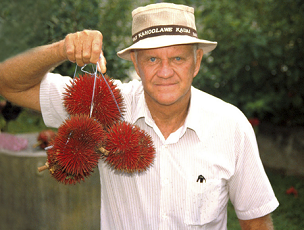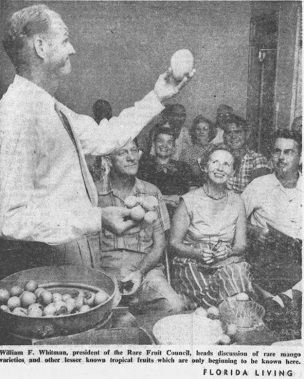From the
Tropical Fruit News, Rare Fruit Council International Miami RFCI
Fruits Introduced by Bill
Whitman

Fig. 1
On the evening of March 11, 1955, a small
group of
horticulturally-minded people assembled in the Simpson Memorial Garden
Center. The purpose of the meeting was to form an active organization
to promote the progress of tropical pomology in South Florida. Those
attending were Seymour Goldweber, Dr. Roy Harkness, Dr. R. Bruce Ledin,
Duffield Matson, Jr., Salvatore Mauro, Julia Morton, Kendal Morton, Dr.
George D. Ruehle, William F. Whitman and Seymour W. Younghans.
2
At
this first meeting, Mr. Whitman gave the opening address outlining the
need for such a pomological organization. He stressed the fact that
South Florida enjoys a unique climate in the United States enabling it
alone to grow many cold-intolerant fruits that would not survive the
winter in any other part of out continental boundaries. It was
suggested that we should take the fullest advantage of this climatic
opportunity by making a concerted effort to secure superior tropical
fruit varieties from foreign countries, to be on the alert for chance
seedlings of merit from our own semi-tropical areas, to encourage
breeding, to learn more about cultural requirements by exchanging
information and ideas on this neglected but interesting and important
field, the know-how of growing tropical fruits.
2
The
"Rare Fruit
Council", as the name implies, is a group devoted primarily to the
study and advancement of the lesser-known tropical fruits which have
not yet achieved economic importance or are not cultivated on a large
scale in this country. It affords an excellent opportunity to assemble
monthly, in a congenial group, those interested in this fascinating
field of endeavor. The enthusiasm shown by this small gathering leads
us to anticipate a bright future. It is hoped that the Rare Fruit
Council will continue to grow and its members, working as a team, make
a permanent contribution to the advancement of tropical pomology around
the globe, as well as in our own "backyard" of South Florida. 2
Full
article Rare Fruit Council, A Tropical
Fruit Study Group, delivered at the 68th
Proceedings of the Florida State Horticultural Society, Clearwater,
Fl. Nov. 1-3, 1955. pdf
Editor's
note: The
RFCI is 45 years old this month (2000) and when Maurice Kong come to us
with
the idea that is was time to honor William Francis Whitman we
wholeheartedly agreed and jumped into the project. Bill is not only one
of the RFCI founders, but has also introduced many of the plants we
love and is funding color for TFNews. Bob.
Fruits Introduced by
Bill Whitman 1
1950:
Musa
hybrid, Plantain 'Dwarf Puerto Rican'; Puerto Rico
1951: Melicoccus bijugatus,
Spanish lime 'Queen'; Key West
1952: Chrysophyllum cainito,
Star apple 'Haitian'; Haiti
1953: Musa fehi, Fehi;
Hawaii
1954: Pouteria
viride, Green sapote; Honduras Dimocarpus longan,
Longan 'Kohala'; Hawaii Macadamia
integrifolia, Macadamia 'Keahou'; Hawaii Psidium guajava,
Guava 'Seedless Indonesian'; Java
1955: Annona squamosa,
Sugar apple 'Seedless Cuban'; Cuba Musa
hybrid, Plantain 'Maiden'; Bahamas
1956: Mangifera odorata,
Kwini; Indonesia Cynometra
cauliffora, Namnam; Indonesia Musa hybrid, Banana
'Ice Cream'; Hawaii Musa
hybrid, Banana 'Williams'; Hawaii Lansium
domesticum, Langsat 'Conception'; Philippines
1957:
Mangifera indica,
Mango 'Okrong'; Thailand Mangifera
indica, Mango 'Mun'; Thailand Licania platypus,
Sunsapote; EI Salvador Lansium
domesticum, Langsat 'Uttaradit'; Thailand
1959:
Pometia pinnata,
Fijian longan; Hawaii Melicoccus
bijugatus, Spanish lime, 'Cuban No. I'; Cuba Melicoccus bijugatus,
Spanish lime, 'Cuban No.2'; Cuba Annona
muricata, Soursop 'Cuban Fiberless'; Cuba
1960:
Syzygium samarangense,
Wax jambu 'Sri nark'; Thailand Musa
hybrid, Banana 'HaaHaa'; Hawaii Musa
hybrid, Banana 'Hua Moa'; Hawaii
1961: Pyrus malus, Apple
'Dorsett Golden'; Bahamas 1962: Couepia
polyandra, Olosapo; Hawaii Mouriria guianensis,
Cometure; Venezuela Nephelium
lappaceum, Rambutan 'R-7'; Malaysia
1963: Annona hybrid,
'African Pride'; Australia Artocarpus
altilis, Breadfruit 'Puero'; Tahiti Pouteria obovata,
Lucma; Peru
1964: Rheedia
sp., Charichuela; Iquitos, Peru Myrciaria
paraensis, Camu-camu; Iquitos, Peru Quararibea cordata,
S. American sapote; Iquitos, Peru
1966: Mangifera indica,
Mango 'Simanalagi'; Indonesia Musa
hybrid, 'Pregnant Banana'; Hawaii
1967: Litchi chinensis,
Lychee 'Amboina'; Honduras Bouea
macrophylla, Maprang 'Wan'; Thailand Sandoricum koetjape,
Santol 'Bangkok'; Philippines
1968: Baccaurea dulcis,
Rambeh 'Namtansai'; Thailand Pouteria
sp. 'Ross sapote': Costa Rica
1969: Mangifera indica,
Mango 'Extrema'; Paraguay
1970: Caryocar nuciferum,
Souari nut; Guyana
1972: Nephelium lappaceum,
Rambutan 'Chompoo'; Thailand
1976: Baccaurea dulcis,
Rambeh 'Rean thong'; Thailand
1977: Planchonella australis,
Australian native plum; Australia
1978: Salacca edulis,
Salak palm 'Gondak'; Bali
1980: Garcinia prainiana,
cherapu; Malaysia
1983: Litchi
chinensis, Lychee 'Emperor'; Thailand
1984: Guilielma gasipaes,
Peach Palm 'Spineless'; Colombia
1985: Dacryodes edulis,
Safu; Zaire Anonidium
mannii, Junglesop; Zaire Landolphia sp., Eta
vine; Zaire
1986: Willughbeia
angustifolia, Kubal vine; Borneo Treculia africana,
African breadnut; Zaire Artocarpus
heterophyllus, Jakfruit 'NS-I '; Borneo Lansium hybrid,
Duku-Langsat hybrid; Borneo Planchonella
australis, Australian native plum; Australia
1987: Artocarpus sericicarpus,
Pedalai; Borneo Artocarpus
integer, Champedak 'Malay'; Borneo
1988: Sarcocephalus xanthoxylon,
Ndea; Zaire Synsepalum
sp., Giant miracle fruit; Zaire Nephelium
cuspidatum var. robustum,
Giant jungle rambutan; Borneo Cocos
nucifera, Coconut 'Pipa'; Costa Rica
1989: Diospyros mannii,
Zevelu; Zaire
1990: Theobroma
grandifforum, Cupuassu; Australia
1991: Pouteria caimito,
Abiu 'Gray'; Hawaii Pouteria
caimito, Abiu 'Z2' Nephelium
mutabile, Purple pulasan; Hawaii Durio zibethinus,
Durian 'Seedless Red'; Hawaii
1993: Artocarpus heterophyllus,
Jakfruit 'Cochin'; Australia Patinoa
almirajo, Almirajo; Australia Marliera edulis,
Carnbuca; Hawaii
1994: Theobroma
grandiflorum, 'Seedless' cupuassu
1995: Annona crassiffora;
Brazil -(Scientific name unknown) Dolea; Zaire Rheedia sp.,
large-seeded Rheedia;
Ecuador Mangifera
casturi, 'Kasturi' mango; Hawaii
1996: Rheedia achachairu,
Rheedia; Australia
1997: Durio zibethinus,
Durian 'Mon Tong'; Hawaii Hexa
crispifforus, Chimpanzee banana; Zaire Annona crassiffora;
Brazil
1998: Annona
salzmannii, Beach araticum; Hawaii Passiffora alata,
Alata; Colombia
1999: Manilkara
bibentata, Tobago gooseberry; Tobago

Fig. 2
William
F. Whitman, president of the Rare Fruit Council, leads discussion of
rare
mango varieties, and other lesser known tropical fruit
which are only beginning to be known here.
Six Decades with Tropical Fruit:
Retrospect
The
year 2019 marks the beginning of the sixth decade of The Rare Fruit
Council International, Inc. (RFCI). Sixty-four years ago, the purposes
of our Council were set by ten founders who met on March 11, 1955 to
establish an organization for the promotion of tropical pomology in
areas of suitable climate. A tropical fruit study group was formed, and
later named Rare Fruit Council by Julia Morton, of the Morton
Collectanea. 3
These
early visionaries dreamed of obtaining rare fruit species from many
foreign countries, improving quality, and selecting desirable
varieties. Since that meeting, hundreds of dedicated members have
fulfilled many of the purposes set by RFCI’s founders to provide the
community with these rare species, publications and lectures for the
education and pleasure of Florida’s fruit enthusiasts. 3
Further Reading
Two
Decades of Tropical Fruit Introduction, delivered
to the Florida State Horticultural Society, 1972 pdf
Back to
Fruit
Index
|
|
